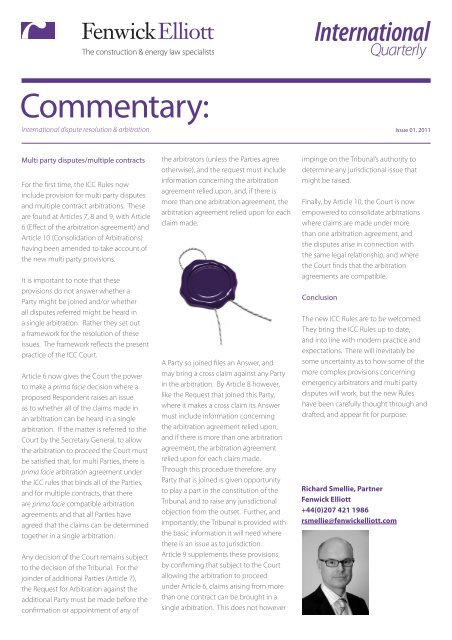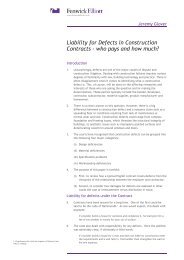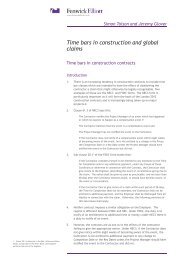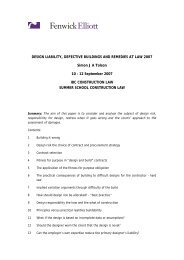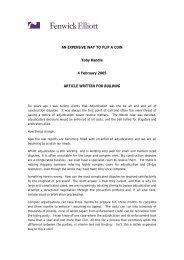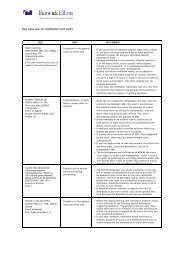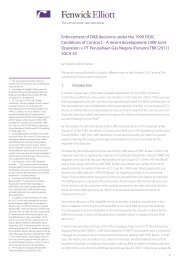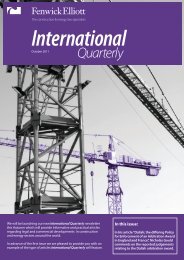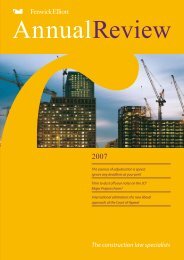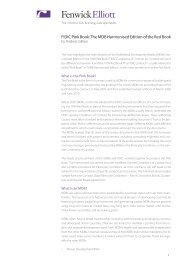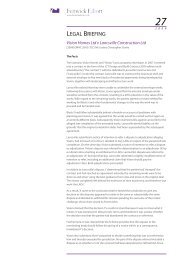download PDF - Fenwick Elliott
download PDF - Fenwick Elliott
download PDF - Fenwick Elliott
- No tags were found...
Create successful ePaper yourself
Turn your PDF publications into a flip-book with our unique Google optimized e-Paper software.
Commentary:International dispute resolution & arbitration Issue 01, 2011Multi party disputes/multiple contractsFor the first time, the ICC Rules nowinclude provision for multi party disputesand multiple contract arbitrations. Theseare found at Articles 7, 8 and 9, with Article6 (Effect of the arbitration agreement) andArticle 10 (Consolidation of Arbitrations)having been amended to take account ofthe new multi party provisions.It is important to note that theseprovisions do not answer whether aParty might be joined and/or whetherall disputes referred might be heard ina single arbitration. Rather they set outa framework for the resolution of theseissues. The framework reflects the presentpractice of the ICC Court.Article 6 now gives the Court the powerto make a prima facie decision where aproposed Respondent raises an issueas to whether all of the claims made inan arbitration can be heard in a singlearbitration. If the matter is referred to theCourt by the Secretary General, to allowthe arbitration to proceed the Court mustbe satisfied that, for multi Parties, there isprima facie arbitration agreement underthe ICC rules that binds all of the Parties,and for multiple contracts, that thereare prima facie compatible arbitrationagreements and that all Parties haveagreed that the claims can be determinedtogether in a single arbitration.Any decision of the Court remains subjectto the decision of the Tribunal. For thejoinder of additional Parties (Article 7),the Request for Arbitration against theadditional Party must be made before theconfirmation or appointment of any ofthe arbitrators (unless the Parties agreeotherwise), and the request must includeinformation concerning the arbitrationagreement relied upon, and, if there ismore than one arbitration agreement, thearbitration agreement relied upon for eachclaim made.A Party so joined files an Answer, andmay bring a cross claim against any Partyin the arbitration. By Article 8 however,like the Request that joined this Party,where it makes a cross claim its Answermust include information concerningthe arbitration agreement relied upon,and if there is more than one arbitrationagreement, the arbitration agreementrelied upon for each claim made.Through this procedure therefore, anyParty that is joined is given opportunityto play a part in the constitution of theTribunal, and to raise any jurisdictionalobjection from the outset. Further, andimportantly, the Tribunal is provided withthe basic information it will need wherethere is an issue as to jurisdiction.Article 9 supplements these provisions,by confirming that subject to the Courtallowing the arbitration to proceedunder Article 6, claims arising from morethan one contract can be brought in asingle arbitration. This does not howeverimpinge on the Tribunal’s authority todetermine any jurisdictional issue thatmight be raised.Finally, by Article 10, the Court is nowempowered to consolidate arbitrationswhere claims are made under morethan one arbitration agreement, andthe disputes arise in connection withthe same legal relationship, and wherethe Court finds that the arbitrationagreements are compatible.ConclusionThe new ICC Rules are to be welcomed.They bring the ICC Rules up to date,and into line with modern practice andexpectations. There will inevitably besome uncertainty as to how some of themore complex provisions concerningemergency arbitrators and multi partydisputes will work, but the new Ruleshave been carefully thought through anddrafted, and appear fit for purpose.Richard Smellie, Partner<strong>Fenwick</strong> <strong>Elliott</strong>+44(0)207 421 1986rsmellie@fenwickelliott.com


